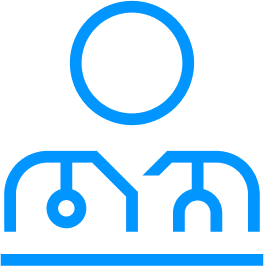Adults


Adults
70 years and older
There are several reasons why people 70 years and older are more likely to develop pneumonia:1
- Weaker immune system. As we age, our immune defe nce system doesn't work at 100%, leaving you more vulnerable to infection.
- Ineffective ability to cough out germs. One of the ways our body gets rid of harmful germs in our airways is by trapping them in mucus and coughing it out. Inability to do this well can increase the chance of harmful germs reaching the lungs.
- Higher likelihood of having other health conditions that make you more vulnerable. Certain conditions like chronic obstructive pulmonary disease, heart failure, diabetes, conditions that weaken your immune system and some forms of cancer have been shown to increase a person's risk.
Symptoms
The common symptoms of pneumonia such as fever, cough and chills don't always appear in older and frail people. Warning signs can be quite non-specific making it difficult to diagnose.2
Symptoms in older and frail people include:
- Confusion or worsening confusion
- Falls
- Reduced appetite
- Urinary incontinence
- Tiredness
- Rapid breathing
Older adults are more than 5x as likely to be hospitalised with pneumonia as younger adults.3
That's because the immune system weakens due to aging, making it harder to fight off infections like pneumococcal pneumonia. Even if you're healthy.
Take the risk assessment
Answering a few quick questions will help you and your doctor understand if you are at risk of contracting pneumococcal pneumonia.

Start

Question 1 of 4
What is your age?
Age can be a risk factor, even if you're healthy.
- I am a parent of a baby
- I am under 50
- I am 50-64
- I am 65-69
- I am 70 or older
Next
Question 2 of 4
Do you have any of these health conditions?
Certain conditions may put you at higher risk for pneumococcal pneumonia, even if they're under control. The medicines you take may also affect your risk. Select all that apply.
- Yes
- No
Please select all that apply
- Asthma
- Chronic lung disease
- Heart disease
- Diabetes
- Chronic renal failure
- Certain cancers
- Non-functioning spleen (asplenia)
- HIV
Next
Question 3 of 4
Do you take a medicine that suppresses your immune system?
This includes some medicines that treat psoriatic arthritis, rheumatoid arthritis, Crohn's disease or ulcerative colitis, among other conditions.
- Yes
- No
Next
Question 4 of 4
Do you identify as Aboriginal or Torres Strait Islander?
- Yes
- No
Submit
Results
Based on your answers, you may not be at increased risk of pnuemococcal pneumonia right now, but you should still take it seriously. The truth is, your risk actually increases as you age.
NEXT STEPS
Stay vigilant and check in with your doctor if your health circumstances change.
Results
Based on your answers, you may be at
increased risk of pnuemococcal pneumonia
and should take steps to protect yourself.
Next Steps
Talk to your Doctor, Nurse or Pharmacist about how you can protect yourself against pneumococcal pneumonia. Bring a copy of this assessment with you to help get the conversation started.
Download Results
Start over
References
- Stupka JE, Mortenson EM, Anzueto A, et al. Community-acquired pneumonia in elderly patients. Aging Health. 2009; 5(6): 763-774.
- Faverio P (as shown on list).
- Patel C et al (as shown on list).



